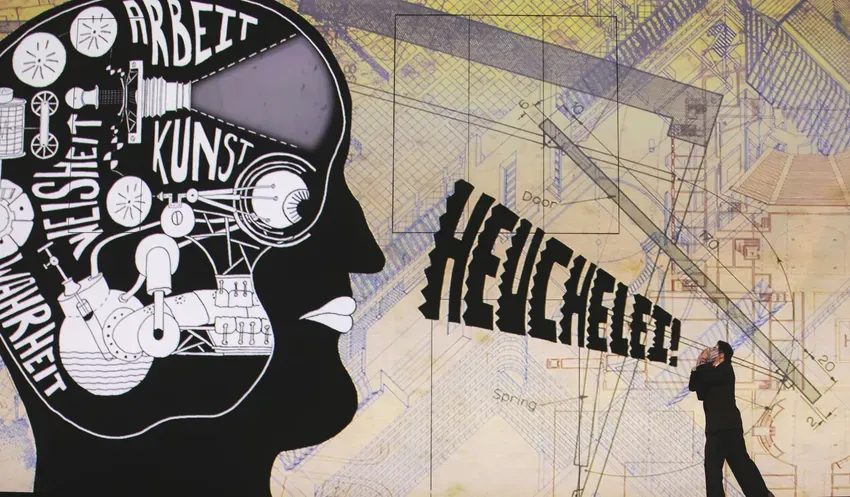The Magic Flute
by Wolfgang Amadeus Mozart
Libretto by Emanuel Schikaneder
Seattle Opera
McCaw Hall, Seattle Center
February 22 and 23
Mozart himself would have loved Seattle Opera's amazing new production of The Magic Flute. It's a combination of live orchestra, video animation with silent-movie-style titles instead of dialogue, and real live opera singers engaging with the video projected behind, around, and upon them. Judging by the raucous applause on opening weekend, this surprising interpretation of a beloved favorite is an unqualified success.
Commissioned for Berlin's Komische Oper in 2012, this wild and crazy Magic Flute has traveled around the world, delighting over one million attendees in 75 venues, on every continent that has opera houses. For all its daring differences, this reinvention of Mozart's most popular work retains his gorgeous music and even adds some: excerpts of his fantasias, played by fortepianist Jay Rozendaal during the zippy title sequences that replace Schikaneder's long and sometimes tedious dialogue.
In his own time, Mozart was an innovative composer who loved combining the silly, the dangerous, and all things new in musical theater. He would have been on his feet with the rest of us, hooting and clapping for this terrific production.
When the red velvet curtain was lifted, the audience was confronted with a massive screen and projections that created a constantly changing, magical world. Revolving doors revealed the performers, singing their hearts out, while the animations surrounding them created flying creatures, monsters, and eye-defying effects. With perfect timing, the singers coordinated their gestures with the projections – a feat as amazing as the singing itself.
Tenors Duke Kim and Victor Ryan Robertson alternated as the elegant Tamino, whose gestures were in perfect sync with the monsters and female magicians who accompanied him. The singing of sopranos Brandie Sutton and Camille Ortiz as his sweetheart Pamina was equally beautiful. Rodion Pogossov's hilarious Papageno might have stolen the show with his whimsical acting and delightful interactions with flying elephants and a cleverly animated black-cat companion.
No one, however – not even the astonishing coloratura soprano Sharleen Joynt, who sang an unforgettable Queen of the Night in a massive spider projection – could steal the show from the animations themselves. The illusions of movement, speed, danger, crazy creatures, and wild colors were the real stars of the show.
Control by machine
At times we pitied the singers, whose freedom of movement was hampered by the set and staging; for most of their time onstage, they had to sing while harnessed to the wall and standing or squatting on a high, tiny platform. The video provided almost all of the motion, while the singers were mostly stationary. When they got to move across the stage, their every motion had to be perfectly coordinated with the video zooming by. Controlled by the speed of a machine, the performers were as hamstrung as Charlie Chaplin in Modern Times. It's a testament to their professionalism and skill that they sang perfectly under these conditions.
One of the most enjoyable moments in the opera has always been at the end, when all the lovers are brought together and Papageno joins his Papagena to sing about their anticipated marriage. They want to have lots of little papageni, and Mozart fans always watch to see whether the kids are imaginary or actually materialize, with gangs of little children running onto the stage as a visual joke. We've seen it both ways, but this projected version has a third: with animated papageni popping out of every possible niche in a projection of a happy home. We counted 42 kids! Try that in a real-life production!
The opening-weekend audiences gave an especially loud welcome to conductor Christine Brandes, a brilliant soprano in her own right, who has become a greatly admired conductor. She is cherished worldwide, not only as a woman who has successfully entered the mostly male world of conducting but also as a Lesbian whose embrace of her identity has inspired LGBTQIA+ performers and musicians worldwide. She says that by being open about her sexuality, "I hope that learning of my relationship will cause [people] to step back and reevaluate any preconceived notions about Gay relationships and our right to fair and equal treatment under the law."
The Magic Flute is an opera all about the triumph of love over forces of evil that stand in the way of authenticity and devotion. What could be more timely in these strange and difficult days?
Performances run through March 9. For more information and to purchase tickets, visit https://www.seattleopera.org.
Support the Seattle Gay News: Celebrate 50 Years with Us!
As the third-oldest LGBTQIA+ newspaper in the United States, the Seattle Gay News (SGN) has been a vital independent source of news and entertainment for Seattle and the Pacific Northwest since 1974.
As we celebrate our 50th anniversary, we need your support to continue our mission.
Your contribution will ensure that SGN remains a beacon of truth and a virtual gathering place for community dialogue.
Help us keep printing and providing a platform for LGBTQIA+ voices.
How you can donate!
Using this Link
Text "SGN" to 53-555
Or Scan the QR code below!



